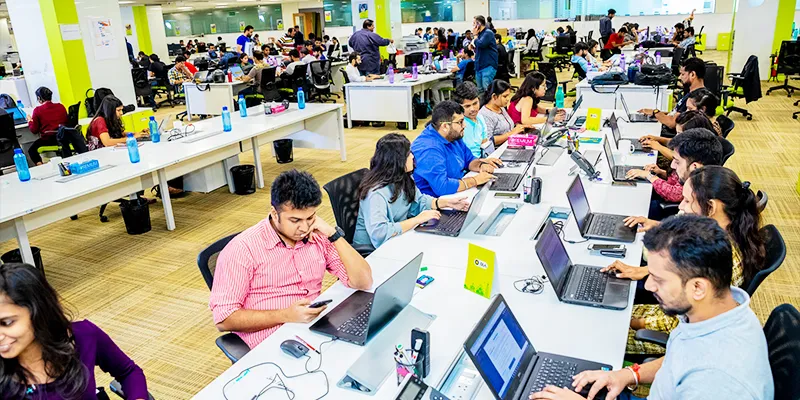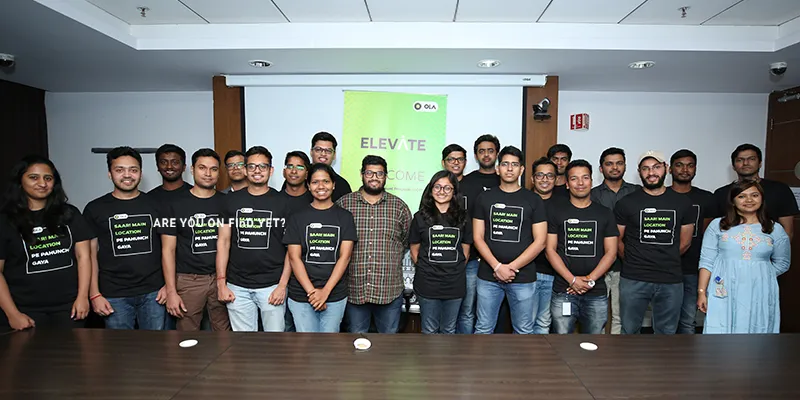Here’s how Ola is creating an entrepreneurial culture with its specialised learning programmes
In its eighth year of operation, Ola is investing in its employees with two learning programmes: Uday and Elevate. Srinivas Chunduru, Chief Human Resources Officer, reveals why Ola is so focused on creating entrepreneurial mindsets.
When the city of Chennai was underwater in December 2015, Ola launched a boat service to rescue people from waterlogged areas and transport them to safer places. The classic example of innovation on the fly was executed by local team members inspired by memes on social media.
Founded by Bhavish Aggarwal and Ankit Bhati, ride-hailing company Ola, which is now in its eighth year of operation, is clear that one thing will help it clear every roadblock: igniting the fire of innovation within every employee.
In an interaction with YourStory, Srinivas Chunduru, Chief Human Resources Officer (CHRO) at Ola, says, “The need for constant development of skill sets is an area of focus with our extensive expansion. We are investing significantly through various first-of-their-kind learning initiatives.”
Ola employs more than 7,000 people today, and the majority of them are below the age of 30 years. These employees, the management believes, are “more hungry and passionate to learn”.

An overwhelming majority of Ola employees are below the age of 30 with a desire to learn new things
Ola introduced two employee-centric learning programmes, Elevate and Uday, to ensure that their staff keeps evolving. The focused, structured, and output-oriented initiatives aim to train new joinees and upskill existing employees.
“These [programmes] are designed to not only help expand employees’ existing skill sets but also to develop a deeper perspective about business. This training will be instrumental in helping them grow as leaders and entrepreneurs,” Srinivas says.
Diversifying skill sets
Uday aims to drive capability building through the creation of specialised academies for functions such as finance, HR, business analysis, and more. Employees are encouraged to acquire specialised training like speaking at public forums, cracking business problems, and attending other training programmes, to acquire a deeper understanding and align their output to business goals.
This initiative includes a fun element: credits can be earned and redeemed for higher learning programmes, including a short-term management development programme at an IIM.
The training also helps employees gain a macro view and understanding of the business and the industry. This allows the freedom to take on more challenges from time to time, offering valuable cross-functional experience.
Srinivas says, “As an organisation that runs various businesses, ranging from mobility to financial services and food to fleet management, we are now able to offer our employees the opportunity to take up new roles across functions or business units.”
Ola, which has been built on a foundation of entrepreneurial zeal, is keen to inculcate this spirit within the organisation. “Being entrepreneurial is a core value and part of our DNA. That means it also becomes an important consideration during hiring, evaluating performance, and investing in, at all times,” Srinivas says.
Focusing on freshers
The company is now eyeing large-scale expansion. On one hand, it is going beyond top metros and entering Tier II and III locations in India, and, on the other, it has made an international foray by venturing into Australia, New Zealand, and the United Kingdom.
Given the differing dynamics of the two markets, the ride-hailing firm startup needs to constantly reskill existing employees and provide the right training to new joinees. (Ola is very focussed on campus hires who inducted from various engineering and business schools).
The Elevate programme, focused on freshers which is spread across 12 months, is designed to make a smooth transition from academic life to the workplace. It includes interaction with the leadership of various business verticals, visiting different cities to understand local business commitments and goals, and spending time on-boarding driver partners, and at call centres, dark kitchens, etc. Activities such as product days and hackathons are also part of this experience.
“The goal is to impart hands-on experience and deeper insight into various business verticals, procedures, and objectives,” Srinivas says. “At Ola, fresh campus hires are often involved in crucial projects that enable them to inculcate an appetite for risk at an early stage of their career. These also allow a senior experienced leader to pivot to a new role altogether,” he adds.
As a technology startup, Ola knows that it is evolving faster than ever and needs employees to invest in themselves. “Through various initiatives like monetary allowances for learning and periodicals, we also encourage employees to invest in themselves,” Srinivas says.

Participants in Ola's employee engagement programme - Elevate
To recognise intrapreneurs, Ola has instituted a first-of-its-kind Founders Award for entrepreneurial employees. This grant of ESOPs and Rs 20 lakh can go towards a social cause or initiative they relate to. Additionally, Ola offers monthly, quarterly, and annual recognition awards (by peers) in various categories to employees.
Uday and Elevate have started showing tangible business outcomes for Ola when employees are part of these programmes. “Their understanding of business and challenges helps them build solutions that are sharper,” Srinivas says.
As Ola goes about achieving new milestones, its culture remains old: every employee, irrespective of their designation or time spent in the company, is strongly encouraged to share ideas, suggestions, and solutions.
One of its most popular products, Ola Auto, is an example. The auto rickshaw service was “suggested” by an intern.
“From a path-breaking innovation, this has now evolved into a key business unit and a significant revenue stream for Ola. It has a very deep social impact and a mobility use case that millions of customers love,” Srinivas says.
(Edited by Teja Lele Desai)










